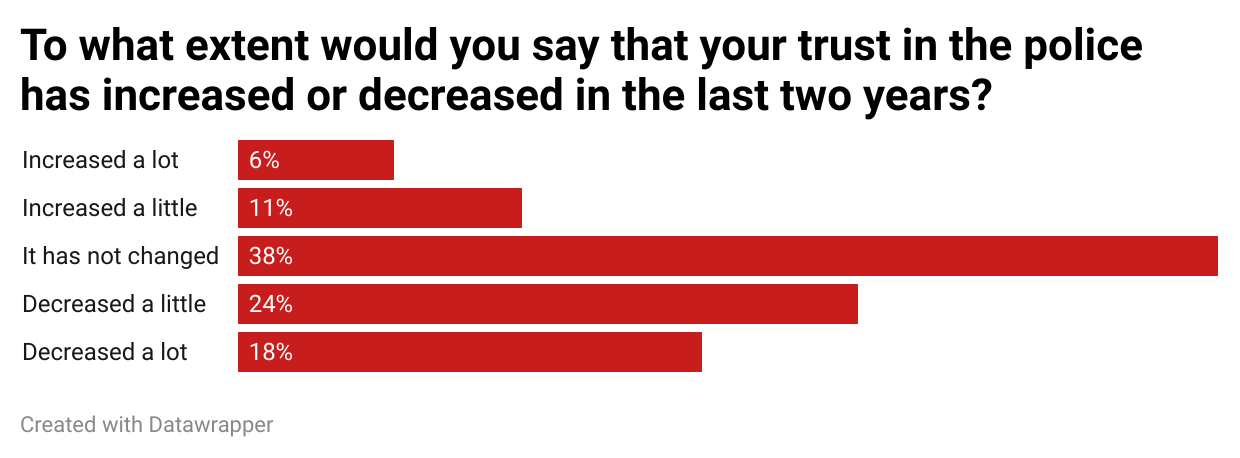Public trust in police revealed amid wave of misogyny and sexual violence scandals
Exclusive: Majority of people polled unhappy with government’s response to policing scandals


More than 40 per cent of British people no longer trust the police amid an avalanche of scandals over police misogyny and sexual violence.
Exclusive polling for The Independent by Savanta suggests that the opinion of almost half of women in the UK has worsened over the past two years – a period marred by the murder of Sarah Everard.
The survey was conducted days after serial rapist David Carrick admitted abusing 12 women over two decades, while the Metropolitan Police repeatedly decided not to sack him over domestic abuse reports.
When asked whether they trusted police, 41 per cent of people said they did not, with 23 per cent distrusting officers “a little” and 18 per cent “a lot”.
When asked if their feelings had changed in the past two years, 42 per cent of Brits said they trusted the police less, while 18 per cent said they trusted them more and the remainder had not changed their feelings.
Women were more likely to report a fall in trust than men and overall, 43 per cent of people said women “should not have confidence in the police in the UK”.
New official figures released last week show that while a record number of rapes are being reported to the police, the proportion charged stands at just 1.6 per cent, and 3.2 per cent of sexual offences overall.
At the same time, a fresh wave of scandals is brewing as more police officers face court cases and misconduct hearings over allegations of sexual offences, domestic abuse and corruption.
Marc Jones, who heads the Association of Police and Crime Commissioners, said trust would “be a long time in the repairing”.
“Policing has got a huge amount of work to do to get its house in order and in the short term that will make it very uncomfortable,” he added.
“There will be story after story saying ‘this isn’t right’ and ‘we’ve found this’. That’s a process they’ve got to go through and they need to be open and transparent about that.”

He called for a “lasting legacy” from the slew of recent horrors, and for lessons to be truly learned “so that policing never gets complacent ever again about public support”.
“What we don’t want 20 years from now is people saying ‘why isn’t it any better?’” Mr Jones warned.
Alison Lowe, west Yorkshire’s deputy mayor for policing, said that she was “filled with terror about what next is coming around the corner”.
“We need to listen to victims, we need to listen to women when they’re talking to the police about their lived experience,” she added.
Rishi Sunak has called on police to “restore public confidence and ensure the safety of women and girls”, while the home secretary has announced several inquiries sparked by the Carrick case.
But the majority of the public said the government was handling policing poorly, with only 7 per cent believing they were responding “very well”.
When split by political party, almost half of Conservative voters thought the government as a whole was doing badly on policing, with 45 per cent unhappy with Suella Braverman and 39 per cent dissatisfied with the prime minister’s performance.

The figures were worse for the supporters of opposition parties, with three-quarters of Labour votes saying the government was poor on policing issues, and 92 per cent of those who voted for the Brexit Party at the last election.
Chris Hopkins, the political research director at Savanta, said: “The public seem to show a willingness to give the police the benefit of the doubt, or at the very least they want to be able to trust an institution whose primary function is to keep us safe, but ongoing stories about the conduct of officers has massively eroded trust in the police generally.”
The National Police Chiefs’ Council said leaders “recognise that confidence in policing, especially amongst women and girls, has been damaged”.
“The public deserve to have trust in any officer they may deal with in their time of need,” a spokesperson added. “Police chiefs are committed to rooting out those who betray our professional standards.”
The body warned that as action is taken against unsuitable officers, more “uncomfortable and difficult” cases will be brought to light, but said that “only action, and the public seeing the result of that action, will rebuild confidence”.
A Home Office spokesperson said: “The home secretary has taken immediate action and asked police chiefs to root out any officers unfit to serve.
“Our absolute priority is cutting crime and making our streets safer and we are providing police forces the resources they need to do this. We remain on track to deliver our commitment to recruit an additional 20,000 police officers, by March.”
Savanta questioned 2,262 people in the UK between 20 and 22 January.
Join our commenting forum
Join thought-provoking conversations, follow other Independent readers and see their replies
Comments


Bookmark popover
Removed from bookmarks